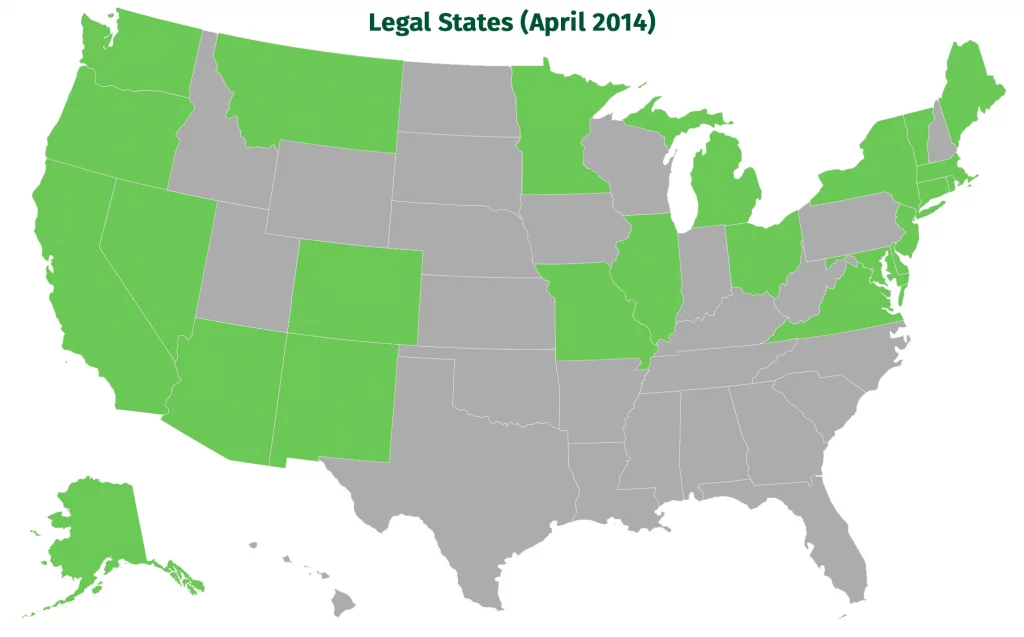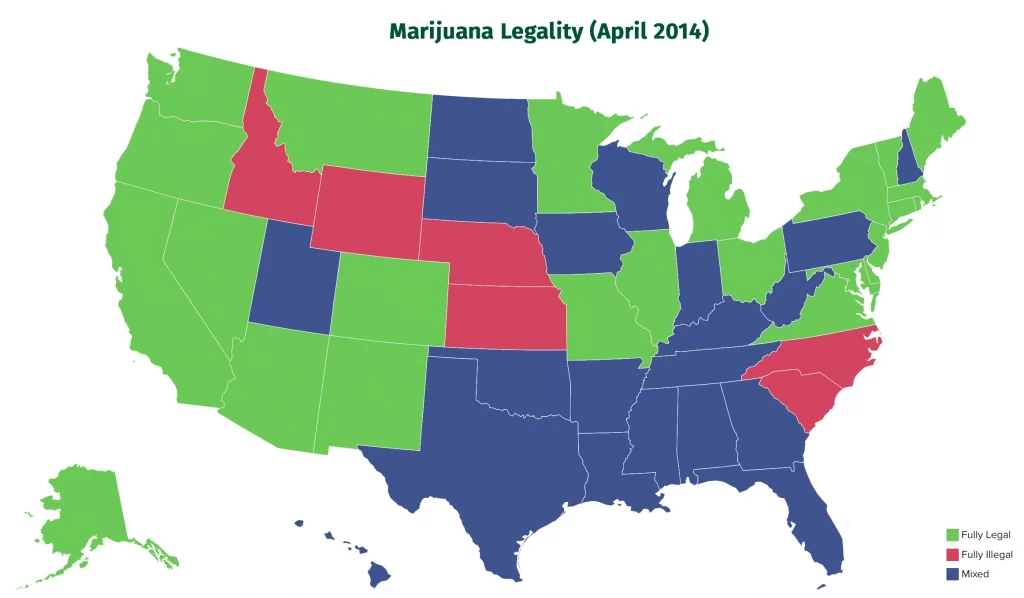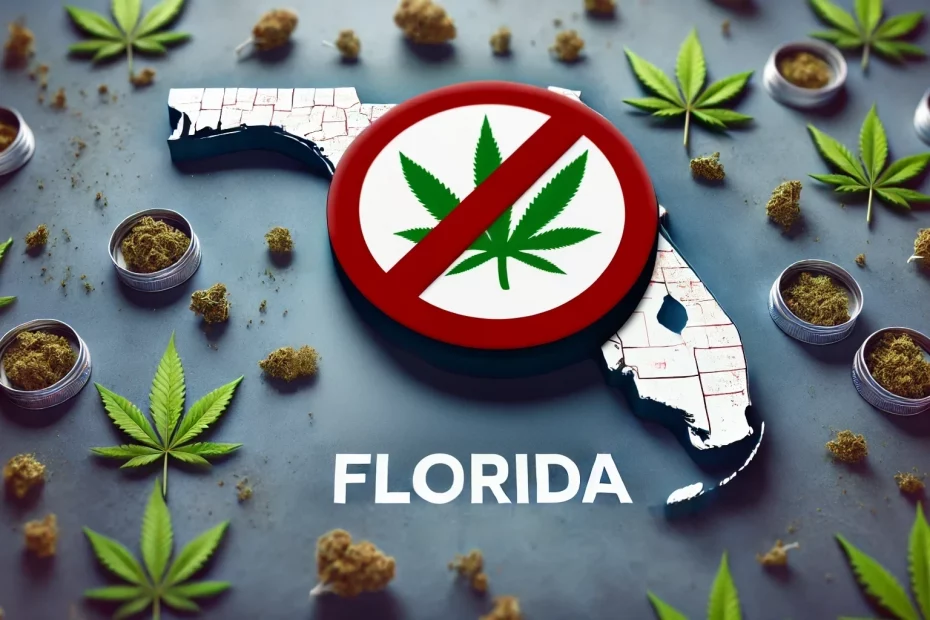What Happened with Florida’s Amendment 3?
Florida’s Amendment—which aimed to legalize recreational marijuana—didn’t get enough votes to pass. Although it received 55.9% of the vote, it needed 60% for approval. This means that even though more people said “yes” than “no,” it still wasn’t enough to make recreational marijuana legal in Florida.
Amendment 3 would have allowed adults over 21 to legally possess, purchase, and use marijuana for recreational use. It was backed by Smart & Safe Florida and also included provisions for licensed facilities to cultivate and distribute marijuana products.
So, what’s the deal for Florida now? Weed is still legal, but only if you’ve got a Medical Marijuana ID Card. Let’s break down what that means and how Florida compares to other states.
Florida’s Medical Marijuana Status: What’s Still Legal
Since Amendment 3 failed, recreational marijuana remains illegal in Florida. However, medical marijuana is still an option for those who qualify. To legally use medical cannabis in Florida, you need a Medical Marijuana ID Card, which is available to residents with certain health conditions.
These conditions and their common associated uses are:
- Cancer: Marijuana can help alleviate nausea and pain related to cancer and its treatments, such as chemotherapy.
- Epilepsy: CBD, a component of cannabis, has been shown to reduce the frequency of seizures in individuals with epilepsy.
- Glaucoma: Marijuana can help lower pressure in the eyes, which is beneficial for those with glaucoma.
- HIV/AIDS: Cannabis can help stimulate appetite and reduce pain and nausea associated with HIV/AIDS.
- PTSD: Marijuana may help reduce anxiety and improve sleep for individuals dealing with PTSD.
- ALS: Cannabis can help alleviate muscle stiffness and spasms, improving quality of life for those with ALS.
- Crohn’s disease: Marijuana may reduce inflammation and relieve symptoms like abdominal pain and nausea in people with Crohn’s disease.
- Parkinson’s disease: Cannabis may help reduce tremors and improve motor skills in individuals with Parkinson’s disease.
- Multiple sclerosis: Marijuana can help ease muscle spasms, pain, and stiffness in patients with multiple sclerosis.
- Terminal conditions: Cannabis is often used to manage severe pain and improve comfort for those with terminal illnesses.
- Chronic nonmalignant pain: Marijuana can be an alternative for managing chronic pain without the use of opioids.
Marijuana may be prescribed for some reasons not listed above and the laws are always evolving. If you’re caught with marijuana and don’t have a card, you might face fines or jail time so keep it legal! Florida’s laws remain pretty strict for now and could quickly bring down your buzz.
How Did Other States Vote?
Florida wasn’t the only state that had marijuana measures on the ballot in the 2024 election. Here’s a quick look at how other states voted:
- Nebraska: Voters approved Initiative 437 (71% “Yes”) and Initiative 438 (67% “Yes”), expanding cannabis use and availability.
- North Dakota: Measure 5 didn’t pass, with 52.5% voting “No.”
- South Dakota: Measure 29 also failed, getting 57% “No” votes.
- Massachusetts: Question 4, which included legalizing psychedelics, didn’t pass, with 56.9% voting “No.”
It’s interesting to see that even in states where marijuana is already legal for medical or recreational purposes, the idea of expanding access can still be divisive.
Where Marijuana is Legal Now

So, where does that leave Florida compared to other states? Currently, recreational marijuana is legal in 24 states and a handful of US territories. Here’s the list:
- Alaska: Recreational and medical use are both legal. Alaska was one of the first states to go fully legal.
- Arizona: Adults can possess up to one ounce and cultivate their own plants.
- California: No surprises here, California has been a cannabis-friendly state for years, leading the movement.
- Colorado: Colorado was one of the pioneers of full legalization, and it’s still going strong.
- Connecticut: Recreational use is relatively new, but it’s fully legal now.
- Delaware: Recently joined the list of states allowing recreational use.
- Guam: Recreational use has been legal since 2019.
- Illinois: Legal since 2020, both recreational and medical marijuana are allowed.
- Maine: Allows recreational use for adults 21 and over.
- Maryland: Maryland has both medical and recreational marijuana, with growing support for expanding access.
- Massachusetts: Both medical and recreational use are legal.
- Michigan: Adults can possess up to 2.5 ounces of cannabis.
- Minnesota: Recreational use was legalized in 2023.
- Missouri: Voters approved recreational use in 2022.
- Montana: Recreational marijuana became legal in 2021.
- Nevada: Tourists and locals alike can enjoy cannabis here.
- New Jersey: Legal since 2021, recreational cannabis is widely available.
- New Mexico: Both medical and recreational use are legal.
- New York: Recreational marijuana was legalized in 2021, and dispensaries are opening.
- Northern Mariana Islands: Legal since 2018, both for recreational and medical purposes.
- Ohio: Legalized recreational marijuana in 2023.
- Oregon: Recreational marijuana has been legal since 2015.
- Rhode Island: Recreational use was legalized in 2022.
- Vermont: Allows adults to use and grow cannabis.
- Virginia: Legal since 2021, with a focus on equity and social justice.
- Washington: One of the first states to legalize recreational use.
- Washington, D.C.: Recreational use is legal, but there are some limitations.
- U.S. Virgin Islands: Both medical and recreational cannabis are legal.
Medical Marijuana-Only States
For those states that have only legalized medical marijuana, here’s the list:
- Alabama, Arkansas, Florida, Hawaii, Kentucky, Louisiana, Mississippi, Nebraska, New Hampshire, North Dakota, Oklahoma, Pennsylvania, South Dakota, Utah, West Virginia, Puerto Rico
In these states, residents need a medical card and a qualifying condition to access marijuana products.
States Where Marijuana is Still Illegal

And where is marijuana still largely illegal? Here’s the list of states and territories where cannabis remains off-limits for recreational (and generally medical) use:
- American Samoa
- Georgia (decriminalized in some places, low-grade CBD allowed)
- Idaho (only low-grade CBD is allowed)
- Indiana (CBD allowed under strict conditions)
- Iowa (Some legality. Read more at Iowa Public Radio)
- Kansas (CBD oil allowed)
- North Carolina (CBD legal, minor THC for epilepsy)
- South Dakota (CBD oil allowed)
- Tennessee (CBD oil allowed, minor THC for epilepsy)
- Texas (CBD with restrictions)
- Wisconsin (decriminalized in some places, CBD allowed)
- Wyoming (CBD legal, minor THC for epilepsy)
Marijuana is still illegal on a federal level, although President Biden has recently pardoned individuals convicted of simple marijuana possession and stopped future prosecutions for similar offenses. It’s a small step forward, but federal legalization still seems far off.
Final Thoughts: Florida’s Marijuana Future
Florida came close to legalizing recreational marijuana, but it wasn’t enough. While the push for legalization is strong, the 60% threshold remains a challenging goal for advocates to overcome. For now, Floridians will need to stick with medical marijuana—if they qualify.
For those in states where marijuana is fully legal, consider yourselves lucky! As the movement for broader legalization grows, maybe Florida will join that list soon. Keep your eyes on the horizon—things could change fast!
Share Your Thoughts
What do you think about Florida’s Amendment 3 not passing? We’re still rooting for you! Are you hopeful for the future of recreational marijuana in Florida? Drop your thoughts in the comments!

